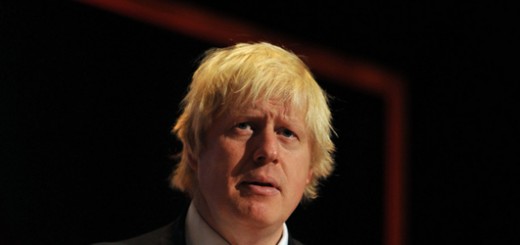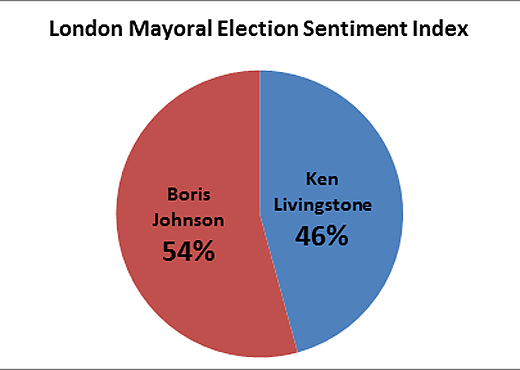
The way in which we follow and engage with politics has changed vastly with the emergence and evolution of social media. The US elections are followed around the world across platforms like Facebook, Twitter and YouTube.
But can social media sentiment predict an election result?
Lithium, the community software and social media marketing firm, set its principle scientist of analytics, Dr Michael Wu, to take a closer look at the London mayoral election. He correctly predicted the result between the two leading electoral candidates for London’s Mayor.
Dr Wu looked at and measured the sentiment within social media posts pulling data from Lithium’s social media monitoring platform, and performed an analysis of the public sentiment data on the social web.
The sample also included research across blogs, Facebook, Twitter, forums, and news. Though there are seven candidates, the study only focused on two, Boris Johnson and Ken Livingstone. The results based on this sentiment analysis put Boris Johnson at 54% and Ken Livingstone at 46%.
In the actual results, Boris Johnson beat Ken Livingston to win a second term as mayor by just 3% after second preference votes were counted, so Dr Wu’s sentiment analysis was not too far off at all.
More traditionally, opinion polls have been a part of the election process. But now those who measure opinion and tone are also considering social media to take the temperature of the masses. The results in comparison between older methods and research online with social networks have been pretty close in the past when it comes to accuracy.
There is no guarantee though that sentiment tracking and actual results will be the same. There are some considerations to take into account when measuring sentiment online. Though the number of people using social media platforms is still growing, there is still a percentage not using these services and the sample still leans toward the more affluent and educated when discussing politics online.
Social political media
Politicians are naturally embracing social media in order to spread their campaigns further. Both of the candidates mentioned in Dr Wu’s study are on Twitter, Facebook and YouTube. The Twitter accounts for both Boris Johnson and Ken Livingstone are campaign team accounts.
Opening up to the masses on social media though also leads to more open and widely spread criticism about how those online accounts are managed. Boris Johnson came under fire when he switched the name of the @MayorOfLondon Twitter account to ‘@BorisJohnson’ and then replaced the link back to City Hall to one that led to his own re-election campaign.
Ken Livingston also fell foul of closer public scrutiny after accusations emerged that the participants in his campaign video were actors. The spokeswoman for Livingstone has since denied this saying, ”Everyone who appears in Labour’s party political broadcast are ordinary Londoners who are backing Ken on 3 May. No actors were used in the broadcast.”
But salacious gossip, mud-slinging and negative campaigning are all a part of the political landscape in any election. The truth on the internet never seems to travel as quickly as a more interesting work of fiction.
Snapshot prediction
While political campaigns use the social web to connect with potential voters and get a snapshot of feedback when a policy is announced or a live debate is taking place, the concept of using it for political polling is still very much in its infancy and it comes with its own set of issues.
Dr Wu himself says: “The important question is not ‘whether social media data can predict election outcome?’ It definitely can. The right question to ask is ‘how long is the predictive window?’ For something that changes very quickly like the financial market, the predictive window will be very short. For things that do not change as fast, the predictive window will be longer. For social media sentiment data, the predictive window for election forecasting is about 1.5 to 2 weeks.”
Social sentiment may prove to be a way to track future election results but whether it will have an impact on voting habits for the undecided or how it might change campaigning is yet to be seen. But as more voters appear online, it is bound to be a place where data analysts continue to look for interesting figures for prediction.
Read more : Social media sentiment tracking predicted the London Mayoral election result


0 Responses
Stay in touch with the conversation, subscribe to the RSS feed for comments on this post.